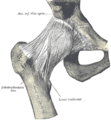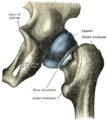Lesser trochanter: Difference between revisions
Appearance
Content deleted Content added
Anatomist90 (talk | contribs) |
added Category:Femur using HotCat |
||
| Line 58: | Line 58: | ||
[[Category:Bones of the lower limb]] |
[[Category:Bones of the lower limb]] |
||
[[Category:Femur]] |
|||
{{musculoskeletal-stub}} |
{{musculoskeletal-stub}} |
||
Revision as of 12:36, 22 April 2013
| Lesser trochanter | |
|---|---|
 Left hip-joint, opened by removing the floor of the acetabulum from within the pelvis. | |
 Upper extremity of right femur viewed from behind and above. | |
| Details | |
| Insertions | Psoas major |
| Identifiers | |
| Latin | trochanter minor |
| TA98 | A02.5.04.007 |
| TA2 | 1366 |
| FMA | 32853 |
| Anatomical terms of bone | |
The lesser trochanter (small trochanter) of the femur is a conical eminence, which varies in size in different subjects
Anatomy
It projects from the lower and back part of the base of the femur neck.
From its apex three well-marked borders extend:
- two of these are above
- a medial continuous with the lower border of the femur neck
- a lateral with the intertrochanteric crest
- the inferior border is continuous with the middle division of the linea aspera
The summit of the trochanter is rough, and gives insertion to the tendon of the Psoas major and the Iliacus.
Clinical significance
It can be involved in an avulsion fracture.[1]
Additional images
-
Right femur. Posterior surface.
-
Right hip-joint from the front.
-
Capsule of hip-joint (distended). Posterior aspect.
-
Hip joint. Lateral view. Lesser trochanter
-
Muscles of Thigh. Anterior views.
See also
References
- ^ Khoury JG, Brandser EA, Found EM, Buckwalter JA (1998). "Non-traumatic lesser trochanter avulsion: a report of three cases". Iowa Orthop J. 18: 150–4. PMC 2378165. PMID 9807723.
{{cite journal}}: CS1 maint: multiple names: authors list (link)
External links
- Anatomy figure: 13:01-11 at Human Anatomy Online, SUNY Downstate Medical Center
- lljoints at The Anatomy Lesson by Wesley Norman (Georgetown University) (hipjointanterior, hipjointposterior)
- Template:EMedicineDictionary
![]() This article incorporates text in the public domain from page 245 of the 20th edition of Gray's Anatomy (1918)
This article incorporates text in the public domain from page 245 of the 20th edition of Gray's Anatomy (1918)




